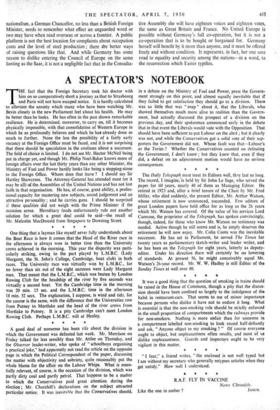A good deal of nonsense has been rife about the
division in which the Government was defeated last week. Mr. Morrison on Friday talked far less sensibly than Mr. Attlee on Thursday, and the Observer leader-writer, who spoke of "schoolboys organising a practical joke," had apparently not read the article on the opposite page in which the Political Correspondent of the paper, discussing the matter with objectivity and sobriety, quite reasonably put the whole blame for the affair on the Labour Whips. What is essen- tially relevant, of course, is the occasion of the division, which was partly dirty coal and partly petrol. That happens to be a matter to which the Conservatives paid great attention during the election ; Mr. Churchill's declarations on the subject attracted particular notice. It was inevitable that the Conservatives should,
in a debate on the Ministry of Fuel and Power, press the Govern- ment strongly on this point, and almost equally inevitable that if they failed to get satisfaction they should go to a division. There was so little that was " snap " about it, that the Liberals, who showed themselves much more alive to realities than the Govern- ment, had actually discussed the prospect of a division on the previous day, and their spokesman announced early in the debate that in that event the Liberals would vote with the Opposition. That should have been sufficient to put Labour on the alert ; but it clearly was not, and while the Conservatives got a solid vote of their sup- porters the Government did not. Whose fault was that—Labour's or the Tories ? Whether the Conservatives counted on defeating the Government, I don't know ; but they knew that, even if they did, a defeat on an adjournment motion would have no serious consequences.
* * * *






































 Previous page
Previous page